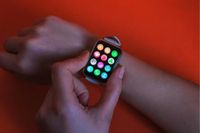With technology exerting increasing influence over personal health, the intersection of digital tools and women's reproductive rights has come under closer scrutiny. Ida Tin, co-founder of the menstrual health app Clue, recently shared her insights on this issue, making waves during the weekend of International Women’s Day (March 7-8, 2025) on De Balie’s podcast. Tin's dialogue centers around pressing concerns about data privacy and the hidden costs often associated with health apps.
Countries around the world are grappling with data privacy concerns, especially among women whose health-related data is highly sensitive. "Ida Tin's work raises questions about the balance between innovation and privacy, and how technology impacts autonomy over our own bodies," reported the podcast, emphasizing the need for tech companies to ethically manage sensitive health data.
Meanwhile, survey results released by YouGov reveal significant apprehensions among UK adults about wearable technology. The data collected from over 2,000 respondents showed 48% expressing worry about potential privacy invasions due to their devices. Among these, 25% indicated they would be more inclined to upgrade their devices if manufacturers offered enhanced data protection.
Notably, 59% of those surveyed deemed wearable technology as too expensive, and 30% dismissed these gadgets as mere fads. This aligns with Tin's concern about the commercialization of women's health technology, where the empowerment promised by these innovations often complicates individual privacy.
The sullying impact of financial barriers on adoption rates is evident—young adults, particularly those aged 18-34, are the most inclined to embrace wearables. Ownership statistics reveal 46% of 18-24-year-olds and 47% of 25-34-year-olds own smartwatches, starkly contrasting with just 19% of individuals aged 55 and over. Yet, over half (54%) of UK adults don’t utilize any wearable tech, signaling dissatisfaction with the products available.
The allure of wearables amplifies as health features take center stage. YouGov's survey revealed 32% of participants want non-invasive glucose monitoring, reinforcing Tin's emphasis on the necessity for genuine health insights rather than superficial data collection. Further, desired upgrades include AI-powered health insights and advanced tracking for emotional and mental health concerns, which 29% and 28% of participants marked as priorities, respectively.
Such insights from the survey demonstrate not just demands from consumers but also opportunities for tech developers, as over 23% of respondents expressed interest in syncing their wearables with healthcare providers. This push toward integrating technology with personal health management aligns perfectly with Tin's vision of leveraging innovation for genuine empowerment, rather than exploitation.
Further complicity arises when considering the potential for tech to entrap rather than liberate. Many women have begun questioning the ethical standards of health applications shaped by predominantly male tech influencers, leading to concerns about whether these innovations truly serve their needs or merely exploit the female experience for profit. The podcast starkly outlines the state of contemporary feminism amid the changing dynamics of technology.
Interestingly, as health insights emerge as valuable, the willingness to pay for such features remains low. Only 9% of survey participants indicated they would be very willing to invest more for devices boasting advanced wellness tracking features, accentuating tension between expectations and value perceived. Rather, many users exhibit reluctance to spend beyond current pricing for enhancements.
Currently, the market for wearables is seeing unprecedented challenges. Technology analyst Counterpoint reported the global smartwatch market fell 7% last year, constituting the first major downturn experienced by the industry. Similar declines were noted for virtual reality headsets, falling 12% year-over-year. The retreat mirrors consumer hesitance and perhaps reflects the cautious optimism surrounding technology's role within personal health frameworks.
Reflecting on these intertwined narratives, one can observe the fierce debates sparked by the digital age's intrusion on women's health. Ida Tin, advocating for transparency and ethical treatment of sensitive data, emerges as a pivotal figure speaking on behalf of women's autonomy within this space. Her remarks during International Women’s Day resonate more than mere momentary advocacy; they forge pathways toward lasting change.
With wearable technology's future hanging precariously, both Tin and participants from the YouGov survey echo the call for pragmatic strides toward sustainable developments—ones prioritizing user privacy and genuine health benefits rather than sheer commercial ambition. The conversation surrounding health tech and women's empowerment is just beginning, with ample room to evolve, expand, and engender accountability amid rising innovation.


